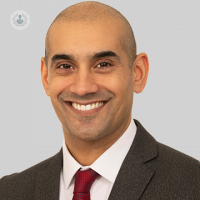Mouth cancer: everything you need to know
Written by:Mouth cancer, also known as oral cancer, is a serious condition that affects thousands of individuals every year. As a medical professional, it is essential to provide information and support to those who may be affected by this disease. Leading consultant oral and maxillofacial/head and neck surgeon Mr Mustansir Alibhai discusses what mouth cancer is, its causes, symptoms, diagnosis, and treatment options.

What is mouth cancer?
Mouth cancer refers to any cancer that develops in the oral cavity, which includes the lips, tongue, gums, palate, and the inner lining of the cheeks. It can also occur in the throat, tonsils, and salivary glands. Mouth cancer typically starts as a small sore or growth in the mouth that does not heal. If left untreated, it can spread to other parts of the body and become life-threatening.
Causes of mouth cancer
The exact cause of mouth cancer is not always clear, but several factors can increase the risk of developing the disease. These include smoking tobacco, chewing tobacco or betel nut, excessive alcohol consumption, a poor diet lacking in fruits and vegetables, and infection with the human papillomavirus (HPV).
Symptoms of mouth cancer
The symptoms of mouth cancer can vary depending on the location and stage of the disease. Common signs include persistent mouth ulcers, red or white patches in the mouth, lumps or swelling in the mouth or neck, difficulty chewing or swallowing, numbness in the mouth or tongue, and unexplained weight loss. It is essential to see a dentist or doctor if you experience any of these symptoms for an accurate diagnosis.
Diagnosis of mouth cancer
Diagnosing mouth cancer typically involves a thorough examination of the mouth and throat, including a visual inspection and physical palpation of any suspicious areas. Your doctor may also perform a biopsy, where a small sample of tissue is removed from the affected area and examined under a microscope for the presence of cancer cells. Additionally, imaging tests such as X-rays, CT scans, or MRI scans may be used to determine the extent of the disease.
Treatment options
Treatment for mouth cancer depends on several factors, including the location and stage of the disease, as well as the patient's overall health and preferences. Common treatment options include surgery to remove the cancerous tissue, radiation therapy to destroy cancer cells, chemotherapy to shrink tumours or kill cancer cells, and targeted therapy to attack specific molecular targets in cancer cells. Your healthcare team will work with you to develop a personalised treatment plan that meets your individual needs.
Mouth cancer is a serious condition that requires prompt diagnosis and treatment. By understanding the causes, symptoms, diagnosis, and treatment options for mouth cancer, patients can take proactive steps to protect their oral health and well-being. If you have any concerns or notice any changes in your mouth, it is essential to seek medical advice as soon as possible. Your dentist or doctor can provide further information and support to help you navigate your journey with mouth cancer.
If you require an osteotomy and would like to book a consultation with Mr Alibhai, do not hesitate to do so by visiting his Top Doctors profile today.


